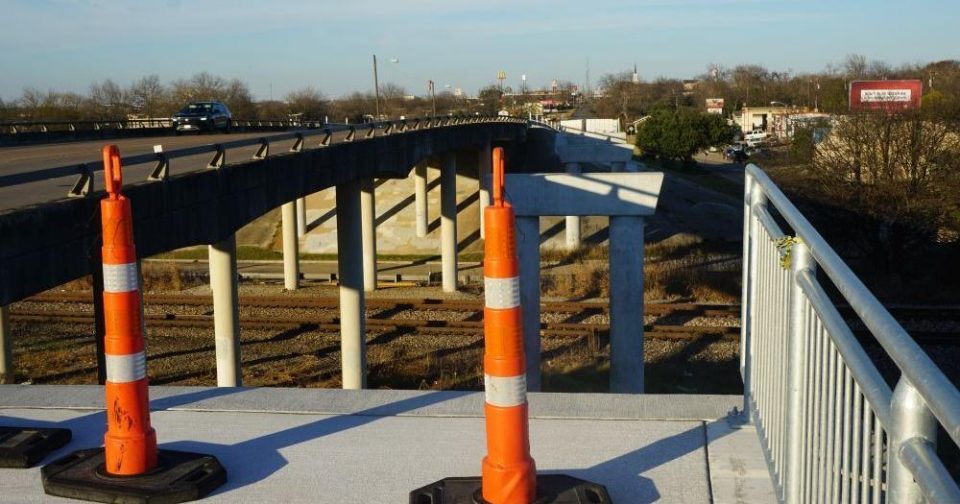Editor’s note: Part one in a four-part series.
A wide sidewalk on South 31st Street leads to nowhere as orange and white road cones block an unfinished pedestrian bridge over the train tracks.
The Temple pedestrian bridge — with two tall concrete supports awaiting completion — is symptomatic of local supply chain issues as work has stalled in recent weeks.
Unable to get the needed materials to complete the project, work crews have let the bridge sit unfinished as they wait.
The same is true for many other city and county projects in the area.
Some local work crews have been shuffled between projects depending on the availability of materials.
“Projects are still being completed but not as quickly because of lead times,” Temple spokeswoman Kiara Nowlin said.
Nowlin said the bridge manufacturer told the city earlier this month that materials to finish the project are expected by Jan. 17 if no more delays are seen.
City officials said that once an official date is set to receive the materials, the contractor on the project will work with the Texas Department of Transportation and BNSF, the owner of the railroad, on a construction timeline.
In the field, work crews for both Temple and Belton have found trouble getting needed products for various projects. Both cities confirmed that, even when they do find the products that they need, they are often more expensive compared to previous years.
Belton public works officials said items used in the field, such as pipes, fittings and valve hats, have seen up to a 30% increase in price.
The city also has seen months-long delays for larger sizes of PVC pipe, a material needed for both homes and city projects. Officials said this has caused work crews to move between job sites erratically based upon what materials are on hand.
Glass also has been another hard product to get for Belton, with the city’s vendors unable to give definitive times for when it will arrive.
Items usually stocked by Temple in its utility warehouse have been hard to replenish in recent months, leading to many delays. Nowlin said the city usually stocks meter boxes, manhole covers and piping materials, among others, in the warehouse.
Nowlin said the city has needed to look elsewhere for these materials, which are often supplied by vendors, instead of purchasing at increased prices.
“Several vendors that held annual contracts that supply the water treatment plant chemicals could not hold their pricing for an additional year,” Nowlin said. “This caused the Purchasing Department to rebid these agreements and award new contracts instead of renewing existing contracts.”
Belton Finance Director Mike Rodgers said his city has had to deal with increased costs from suppliers.
“The city of Belton received a letter on (Dec. 13) from one of its vendors notifying us of a 10% price increase,” Rodgers said. “Neptune Technology Group, the manufacturer of the city’s water meters and its various components, cites the rising costs of materials and shipping as the reason for the increase.”
Similar to their residents, supply chain shortages on microchips and other materials have made it hard for government entities to get needed vehicles.
In September, Bell County officials noted that they were seeing much longer waits than normal for their fleet vehicles.
“It’s not good, they are saying upwards of 18 months,” Assistant County Auditor Ammy James said.
Jeff Buuck, chief deputy with the Bell County Sheriff’s Department, said delays on new vehicles, along with what models can be acquired, will have a big impact on his department. He said he expects the next couple of years to be a struggle.
Belton has reported seeing delays of up to a year for its vehicles, with its fire department expecting increases of about 7% in January for a new fire truck.
In Temple, Nowlin said delays have been a large issue for its fleet services department and getting parts to repair existing vehicles.
Kirk Scopac, fleet services division director for Temple, said employees in his department have worked with its vendors to minimize potential cost increases and prepare for order delays. He said the city has seen a couple of steel parts have a 4.5% surcharge due to back orders.
Scopac said some delays his department has seen can last up to 60 days.
“A couple of repairs have been delayed, but service levels have not suffered,” Scopac said. “While equipment production time frames have been extended, the city’s planning and preparation for asset replacement has kept good equipment in service to support operations.”
Even more reliant on microchips than vehicles, computers and other technology hardware have been hit hard by supply chain issues as well.
Nowlin said Temple’s information technology department has seen costs increase of between 4% and 5% this year. Some of the city’s orders, which should have taken two to three weeks, now can take between four to six months to fill.
The department, Nowlin said, is working through these issues by planning about six months in advance for anything related to these issues.
Chris Brown, Belton’s IT director, said he was seeing increased costs for technology-related purchases.
“In the terms of replacing computers, the cost to replace desktops are up 135%, and the replacement of laptops are up 161%,” Brown said. “I’m sure the increases are going to be similar with anything that contains (computer) chips.”


